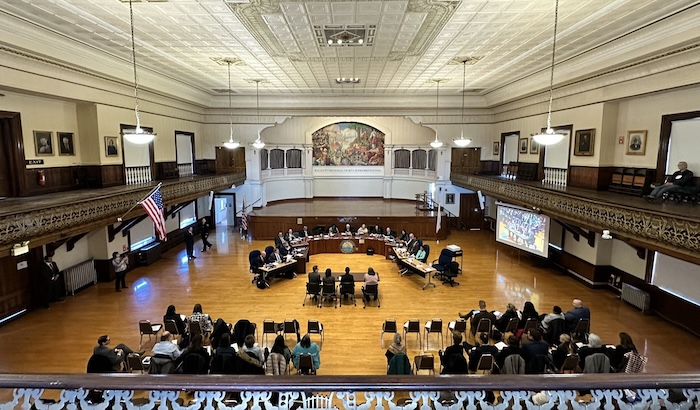
Regardless of when recreational dispensaries materialize in Mass, it’s no secret that the industry presents significant economic opportunities. The word is already out on that one. According to a report by Arcview Market Research, one of many available indicators, the Mass cannabis market is expected to balloon from $52 million in 2016, to an estimated $1.07 billion in 2020 with medical and recreational sales combined.
While much of this revenue will come from front-end dispensary and retailer transactions, there’s also money to be made (or lost, of course) in pure investment—in 2017, investors poured $500 million into private cannabis companies in a $9.7 billion US market. Boston area firms like Dutchess Capital and 4Front Ventures are looking to fund marijuana startups, while Sira Naturals—a company which, judging by how things are going so far, is likely to operationalize some of the state’s first recreational licenses—even has its own microbusiness accelerator.
Julian Goldhill is starting to get in on the game. A rising senior at Tufts University in Somerville, he studies economics and finance and hopes to found his school’s first-ever cannabis club next school year. Oh, and he is also an analyst for Casa Verde Capital (CVC), Snoop Dogg’s own venture capital firm that invests in the ancillary cannabis industry, which means they don’t mess with the plant directly (think pipes, fertilizers, packaging, products of that sort). The firm’s a leading player in the West Coast weed investment landscape, having just closed with a debut fund of $45 million.
As a local student with some venture capital experience, Julian shared thoughts on the expanding industry and explained what he thinks successful investment opportunities might look like here in Massachusetts.
Tell us about your previous experience in investing and working with venture capital firms.
I didn’t have much experience with investing before I came to Tufts, but when I arrived I got involved with the Tufts Financial Group and became a lead analyst during my sophomore year. I’ve had great internships in wealth management and microfinance, and have had some superb mentors in the three years I’ve been here.
Where does your interest in the cannabis industry come from?
It has the most growth potential out of any multibillion-dollar industry over the next five or so years. What broadband internet was to the 2000s and what cable was to the ’90s, cannabis is to the present.
How did you get involved with Casa Verde Capital, especially as a Tufts student?
I reached out to Casa Verde’s partner, Yoni Meyer, a Tufts ’08 alumni. I did some remote work for the company and then flew down for the summer.
What is CVC’s role in investing in the cannabis industry? What specific startups is it looking to fund?
Casa Verde Capital is a venture capital fund focusing on the ancillary cannabis industry, which is commonly referred to as “not touching the plant.” The firm employs a “picks and shovels” strategy to support the emerging industry [Ed. note: As in the old saying, “In a gold rush, sell shovels”]. Through this, we hope to help the space grow and mature. We also have a substantial network and significant market intelligence that we leverage on a daily basis.
What is the investment environment like? Is it competitive? Too early to tell?
What people don’t quite realize yet is that this industry is small in only one respect—it is only small in the sense of how big the industry will become in the coming years.
There are tons of companies out there simply trying to take advantage of this growing market, and there are plenty of legitimate companies with huge potential. Our job is to vet all these companies to find the potential and to find investments that both make sense numbers-wise and portfolio-wise.
In the cannabis industry as a whole, there are a lot of players and it is rather competitive—this is to be expected, as it is up-and-coming. Now this is mirrored on the investment side—there are many people pouring money into this industry, and the onus is on companies to pick the correct strategic partners for their business.
What should Massachusetts investors look for in terms of capital criteria?
Businesses that are able to scale and scale quickly. With laws changing all the time, the companies that are able to grow at the flick of a switch are going to be successful. That is why we focus on the ancillary side—the service firms that provide the backbone to this industry will thrive. When I say service firms I am talking about the business-to-business wholesalers or ordering platforms—LeafLink, for example—the delivery companies, such as Eaze, the point of sale software providers, like Green Bits, and the tracking/compliance companies, like Trellis.
What’s your specific role at CVC?
I am a summer analyst. I do a lot of things, from company due diligence, to industry research, to participating in calls with prospective companies. Every day is extremely interesting and I am learning a lot.
Casa Verde is obviously out of Los Angeles, but what can you say about the Boston cannabis industry with the legalization of recreational pot and commercial adult-use cannabis sales beginning soon?
LA only legalized recreational consumption in January of 2018, and since then the market has exploded—in a good way. All I can say is that big things are going to happen in Boston. Plenty of people on the West Coast believe Boston has the potential to be the LA of cannabis on the East Coast.
Get all your New England cannabis headlines in one place by subscribing to our free newsletter at talkingjointsmemo.com.

























